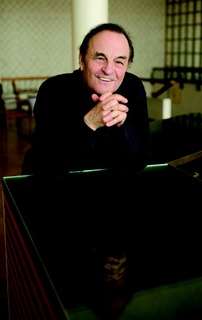|
Back
Stravinsky double-bill Zurich
Tonhalle
04/08/2011 - & April 6, 7, 2011
Igor Stravinsky: Apollon Musagète – Oedipus Rex
Petra Lang (Jocaste), Paul Groves (Oedipus), Fabio Trümpy (Le Berger), Robert Gierlach (Créon), David Wilson-Johnson (Tiresias), Alain Carré (Narrator)
Schweizer Kammerchor, Friz Näf (Chorus Master), Tonhalle-Orchester Zürich, Charles Dutoit (conductor)

C. Dutoit (©Priska Ketterer)
In 1927 Stravinsky was in Paris; inspired there by a new production of Serge Diaghilew’s Ballets Russes, and featuring choreography by George Balanchine, Stravinsky decided to compose some ballet music. He received a timely commission from the Library of Congress which required him to use only six dancers, a small orchestra and last not more than 30 minutes, but he was given a free choice of subject. Stravinsky had for some while been thinking of writing a ballet on an episode in Greek mythology and took Apollo as his title and subject. He chose to make a “ballet blanc” (not a “ballet d’actions” with a defined programme but concentrating on the technical and highly stylised aspects of ballet), and wrote it for a refined ensemble manifested as a orchestra of 34 string players.
The multi-faceted piece has plenty to offer, magical and delightful in turn, albeit short in memorable melody. Its livelier sections as the piece progress have more direct appeal. The Tonhalle’s strings impressed with their tone and ensemble, Dutoit was his usual suave, elegant self. His love of Stravinsky was apparent in highlighting many of the piece’s charms.
Oedipus Rex was written at virtually the same time as Apollo and is not performed in the concert hall all that often; it is rather a hard piece in many ways to digest. It falls within his early “neo-Classicist” period, tending to depersonalise his music, making it sound cool and analytical; it is mostly in the minor mode and its effect is both chilling and mesmerizing.
Paul Groves’ Oedipus had a slightly shaky and awkward opening but then impressed throughout with firm declamatory tone and fine intonation. Robert Gierlach was no more than an adequate Créon. Alain Carré was a very Narrator; he spoke in French which most burghers of Zurich claim to at least understand. Petra Lang was her usual class act, the only singer to really act the part. The young Swiss tenor Fabio Trümpy in the minor part of the Shepherd impressed with his clean, bright tone. David-Wilson Johnson added the right amount of bass gravitas as Tiresias but sounded rather gravelly; perhaps a string of performances had taken its toll by the final performance. The evening’s real heroes, however, were the basses and tenors of the Schweizer Kammerchor. The choral parts are difficult and, by and large, they were dispatched with consummate skill and plenty of volume (I counted some 80 singers, some force). If there must be a criticism, there was perhaps too much fortissimo and not enough dynamic shading.
Dutoit kept the entries razor-sharp; he tried and mostly succeeded in keeping the orchestra restrained to allow the singers to be heard. One did however feel rather battered at the end.
John Rhodes
|